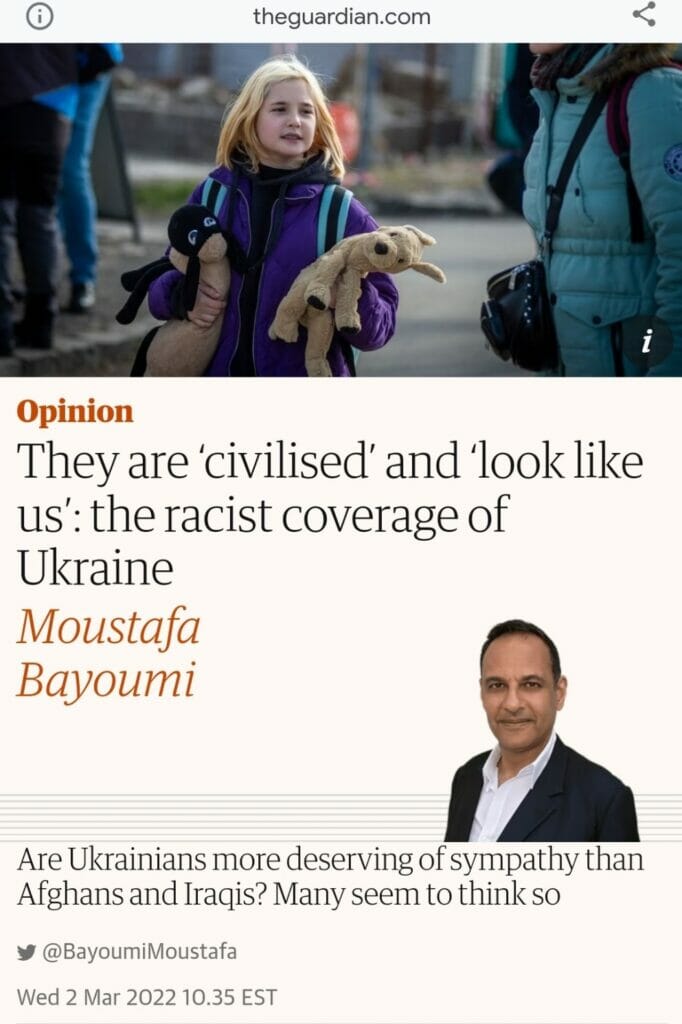The Russian Invasion of Ukraine through My Burmese Eyes
TRANSCEND MEMBERS, 14 Mar 2022
Maung Zarni | FORSEA – TRANSCEND Media Service
None of the leading liberal democracies of the West really honours the principles they loudly espouse such as nonviolence, popular and state sovereignty, human rights, or democracy, nor do they support democratic resistance, armed or nonviolent, unless such support serves their hidden interests, whether commercial or geostrategic.
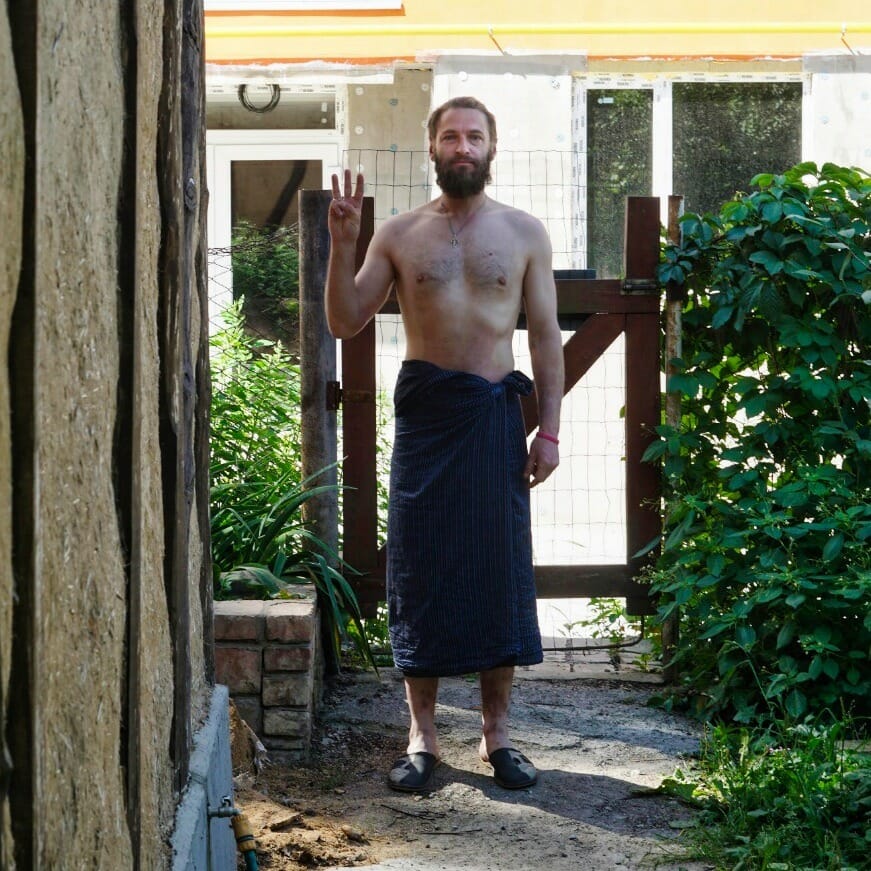
The author’s Ukrainian friend Petro in his home near Kyiv, with his 3-finger solidarity gesture for Myanmar’s New Oo Revolution, 2021.
13 Mar 2022 – I have never been to either Petro’s Ukraine or Putin’s Russia.
But the news of Putin’s conscript Russian army launching a full-scale invasion – deeply unpopular with the Russian people at home as evidenced in anti-invasion protests across Russian Federation – conjures up old memories of my limited interactions with Putin’s functionaries including Sergey Lavrov, the Foreign Minister.
It is also extremely distressing to see real-time images of millions of Ukrainians, including the elderly, the women, the toddlers and older kids, abandoning their hometowns and cities under siege and fleeing into neighbouring states of Poland, Romania, Moldova, Hungary and even Russia.
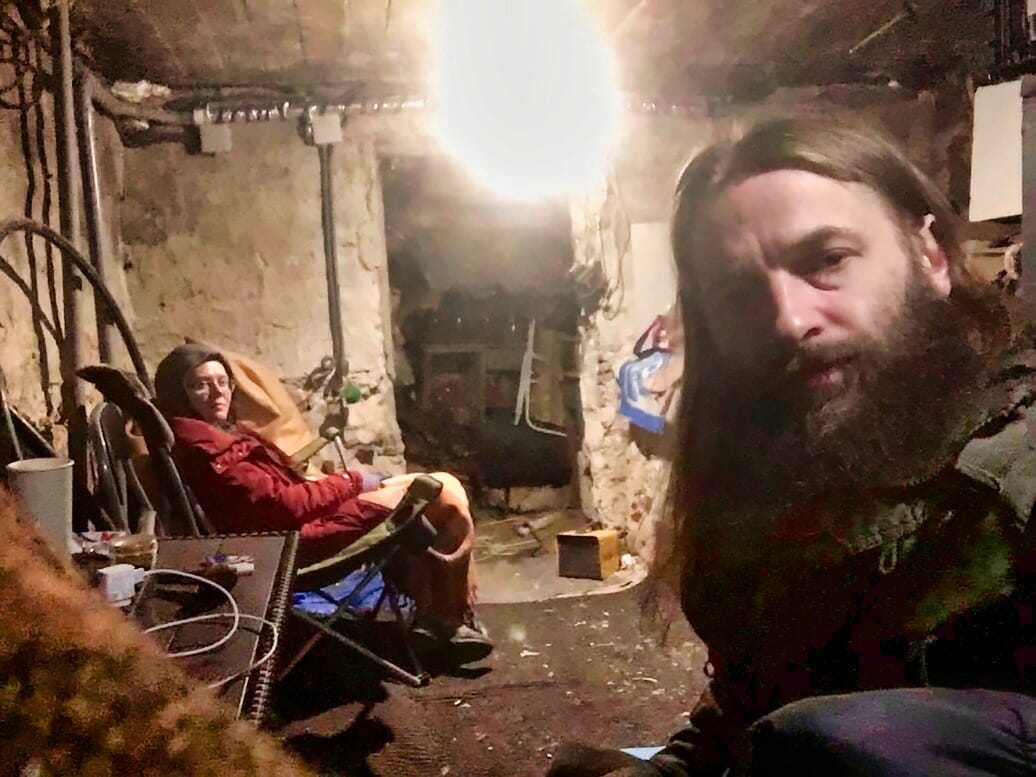
Petro and his wife hiding in the basement of their home, as their country came under siege, March 2022
It is so, not least because Petro, a Ukrainian brother of mine – I call any decent man “brother”, and treat them accordingly, irrespective of skin colour, nationality, or faith– has been held up in the basement of his home in a smaller town outside of the capital Kyiv. Petro is a highly talented videographer in his early 40’s. And he and I spent 3-nights and 3 days in Krakow, Poland, together. He was there to film our group of 19 other activists and scholars of genocide on a study tour of Auschwitz-Birkenau during the first Covid lock-down in March 2020. The educational film was entitled “Auschwitz: Lessons Never Learned”.
I wonder if Petro would do another one with a similarly painful title for Vladimir Putin and post-Soviet Russian audiences, “Afghanistan: Lessons Never Learned”, that is, if my Ukrainian brother survives the ongoing Russian assault.
In March 2020, This March, a group of 19 human rights activists from Japan, Rwanda, USA, Canada, Germany, Ukraine and Myanmar, including 9 Burmese and 2 Rohingya activists visited Auschwitz where they paid respect to 1 million Jewish and other victims of the Holocaust.
The Soviet Union in Burmese Historical Memories
As a young Burmese, I read horrid tales of the Soviet Union as a totalitarian communist dystopia.
In sharp contrast, my grandfather’s generation of anti-colonial Burmese looked to the Soviet Union and the Leninist revolutionary state as Another World vis-à-vis the economically predatory capitalist-imperialist policies and practices of Kipling’s White Man. As a matter of fact, the original constitution of the Union of Burma – drafted in 1947 – as a post-colonial independent republic, with its right of secession for the national minorities and non-racialized citizenship notion, was heavily inspired by the writings of Lenin and Stalin. Our slain architect of Burma’s independence from colonial Britain, Aung San, was quoting liberally the writings of the Soviet leaders immediately following the World War II.
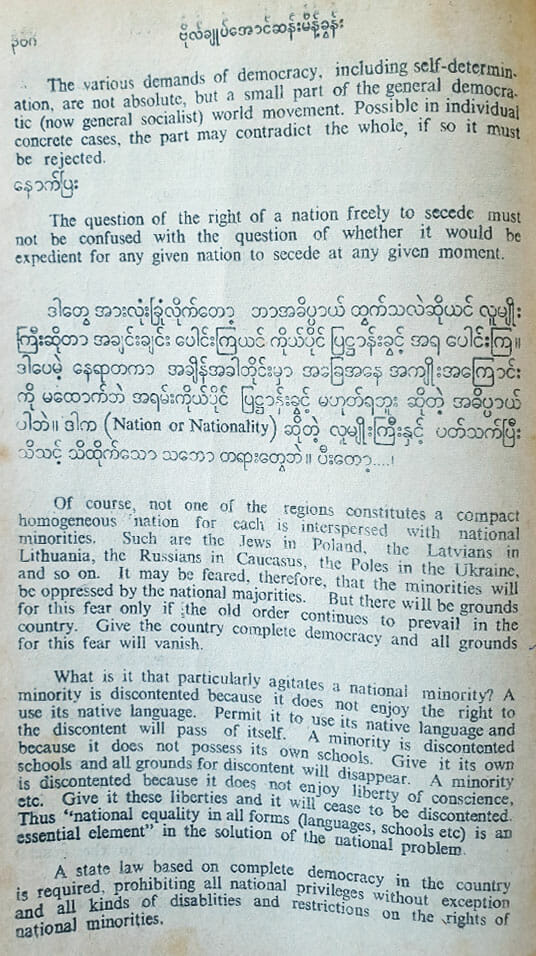
In one of his major addresses to the MPs from his party known as the Anti-Fascist People’s Freedom League (AFPFL), (delivered in Burmese), Aung San, the post-WWII leader and the party head, quoted Lenin, Stalin and Marxist writings on national minorities, self-determination, nationality, and so on. 19 May 1947.
But in post-colonial Burma, the shine of the once-inspirational Leninist model for liberation movements against the White Man and his Civilizing Mission had begun to fade by the early Cold War decades. The Soviet Union unravelled in the failed perestroika and glasnost years of the 1980’s under Gorbachev’s leadership as he tried to save the Communist Party from itself via semi-Free Market reforms.
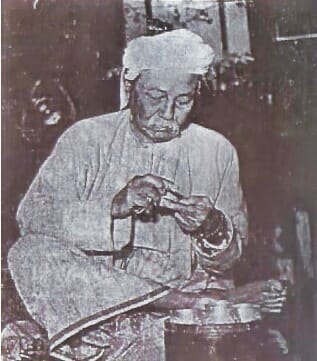
Thakhin Kodaw Hmaing, at home in Rangoon, making betel nut for chewing. Wikipedia Commons
In the 1950’s the left-leaning leaderships of independent Burma sent Burmese socialist scholars to study in Soviet Union, who discovered that USSR wasn’t really working even then. Some of our nationally acclaimed writers were heavily influenced by Russian writers, became involved in peace movements. The grand old man of culturalist Burmese nationalism, namely Thakhin Kodaw Hmaing, was awarded Stalin Peace Prize in 1954, and a group of writers from my city of Mandalay accompanied him to Moscow for the award ceremony.
My own uncle (by marriage) was a staunch leftist student activist at Mandalay University. In our extended family house, I discovered that my Communist uncle had a wooden box full of books by and about Russian writers and military leaders including Leo Tolstoy and Marshall Zhukov. As a young middle-school student, I remember flipping through the pages of his books, all in English, without understanding much.
A few decades on, the Burmese dictator and general, Ne Win, ushered in the Union of the Socialist Republic of Burma – a one-party military dictatorship, with a new “authoritarian constitution,” a carbon copy of the now defunct East Germany (German Democratic Republic or GDR), in 1974. I was then 10 years old. When I began researching Ne Win era foreign relations I discovered that West Germany supplied arms and set up an arm factory while it was, in return, granted mining and oil exploration concessions. Across the street in the East, the GDR’s dreaded State Security Ministry, known as Stasi, was training Ne Win’s military intelligence officers.
The Soviet Bloc was therefore never a far-away thing for us the Burmese.
My own generation that came of age during this Soviet Bloc-modelled military dictatorship, with its socialist veneer, in the 1970’s and 1980’s, absolutely hated Ne Win regime and switched our gaze to the liberal democratic West in search of a model for post-dictatorship Burma, and importantly, political, moral and material support. The irony was the liberal West – from Jimmy Carter’s White House to Whitehall in London – that we looked to as our new inspiration was also arming and funding our dictatorial rulers and executioners under the guise of anti-narcotics operations. The Burmese military staged chronically narcotics-burning ceremonies in front of western diplomats and UN officials while holding its nose regarding heroin-production and trafficking from the army-controlled territories. The army strategists used narco-militias in Eastern Shan state such as Kokant (Han Chinese with several centuries of roots inside Burma) as intelligence-gatherers and proxies against Shan and other nationalist separatists in the highlands along Thai and Chinese borders.
The Soviet Union did not live to welcome the New Year of 1992: the one-party totalitarian Communist state officially died at the hands of the Russian republican nationalist Boris Yeltsin on New Year’s Eve, 1991. Yeltsin came under the sway of American “Free Market” evangelists, from Jeffrey Sachs’ Harvard International Development Institute to George Soros and Wall Street, hell-bent on privatizing anything of value in the Party’s possession. The early stage was set for the birth of a new class of oligarchs, or in American lingo, billionaires. Yeltsin had elbowed his former boss Gorbachev out of power by the end of 1991.
The West and its Empty Rhetoric of Democracy Support
The quest for Western support for our liberation movements against the home-grown dictatorships has also proved bitterly disappointing to the Burmese democrats and dissidents over the last half-century. For we learned that the Trans-Atlantic West (Canada, USA, UK and European Union) typically talk the talk of liberal values, democracy, human rights, international law and the rule-based World Order. Intoxicated with its Cold War triumphalism, Washington and its European dependencies invariably failed to walk the talk of democracy and freedom. Their policy emphasis, in hindsight, was integrating countries under formerly authoritarian regimes into the Global Capitalist Order – the Free Market – which they managed and profited vastly from.
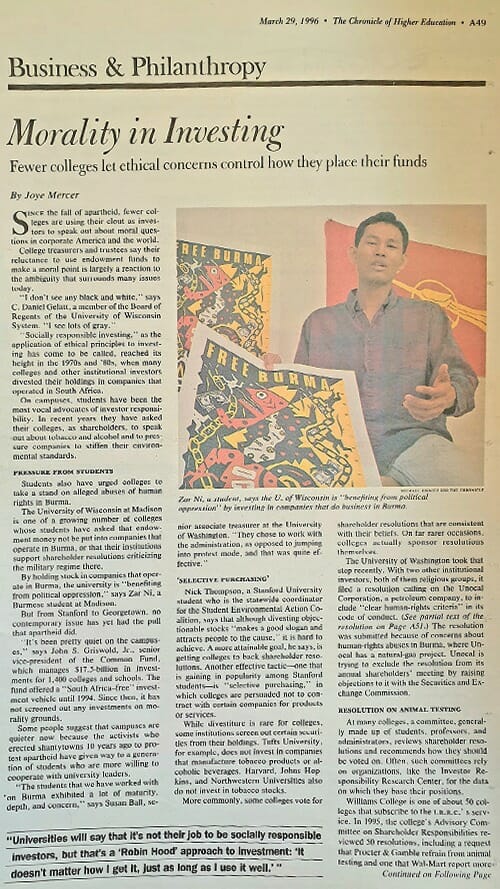
“Morality in Investing, (or lack thereof), The Chronicle of Higher Education, 29 March 1996
During my 33-years as a Burmese activist living and working in the West, I learned first-hand that London, Brussels, Berlin, Paris, and Washington, do not really support democratic struggles, armed or non-violence, if doing so does not advance their strategic and “Free Market” agendas.
Matthew Daley, the now retired Deputy-Assistant Secretary of State in the East Asia Bureau told me one-on-one in his State Department office in Washington 20 years ago, “you Burmese find your own Burmese solutions”. He laid bare US Government’s honey-tongued liberal rhetoric of supporting democratic struggles against the tragic example of the Hungarian uprising of 1956, which ex-General & President Dwight Eisenhower’s administration encouraged but did nothing concrete to support when the Soviet tanks rolled into Budapest and subsequently crushed Hungarian dissent.
However, Hungary is not an isolated case of Western betrayal nor is it the lone victim of empty liberal rhetoric of democratic solidarity. There are other millions in S. Vietnam, the Middle East, Afghanistan and currently, Ukraine who were left to fend for themselves, fighting America’s proxy wars.
Enter Myanmar’s initially peaceful Nwe Oo Revolution triggered by the ousting of the re-elected Aung San Suu Kyi government on 1 February 2021. The United States, the United Kingdom and European Union have so far offered no meaningful support while repeating ad nauseum the mantra of “peaceful opposition” to Myanmar’s genocidal regime of General Min Aung Hlaing, which has so far slaughtered over 1,000 activists and locked up over 10,000.
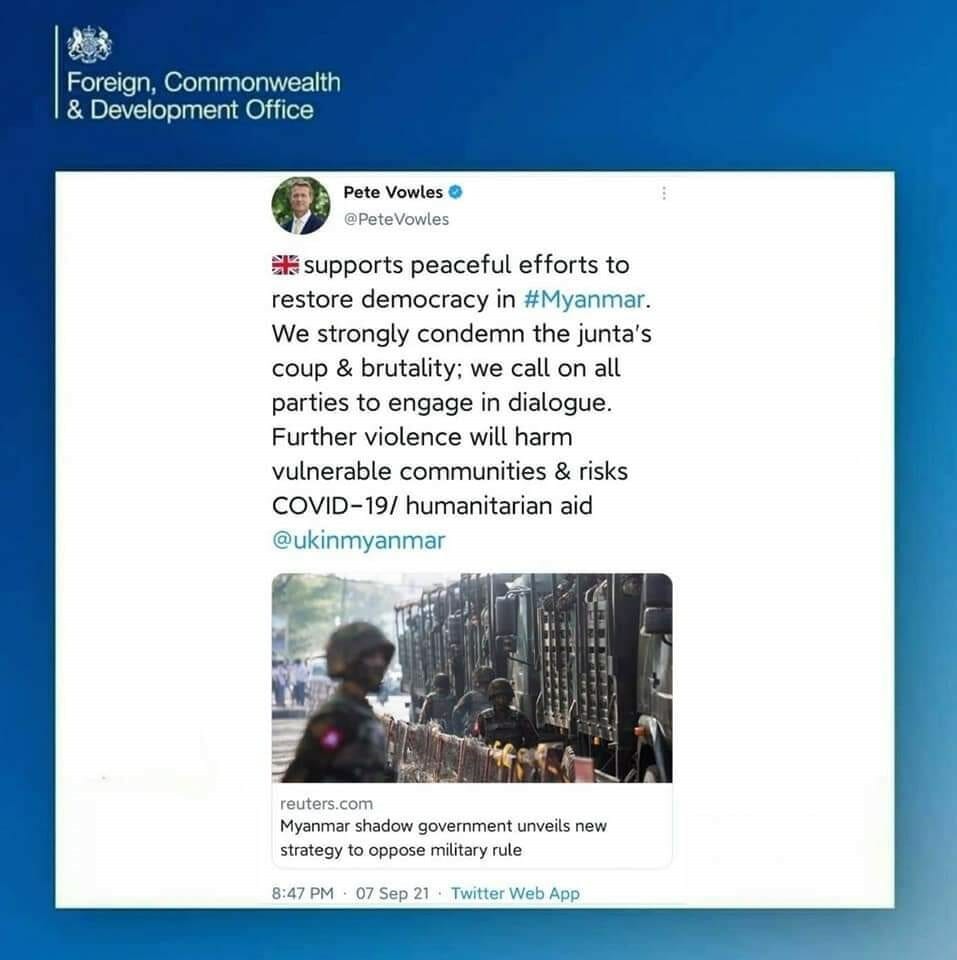
7 September 2021-dated tweet by the British Ambassador Designate to Myanmar
For the first-time in 34 years, since the nationwide People Power uprising of 1988 ended with 3,000 deaths, the Burmese dissidents – and public at large – wised up: they stopped talking about the United Nations’ meaningless Responsibility to Protect doctrine. They make no mention of the Security Council, nor call on Western powers to intervene: the country is now littered with several hundred self-defence civilian militia – known as People’s Defence Forces – operating in cooperation with and under the guidance of some of the 22 Ethnic Resistance Organizations.
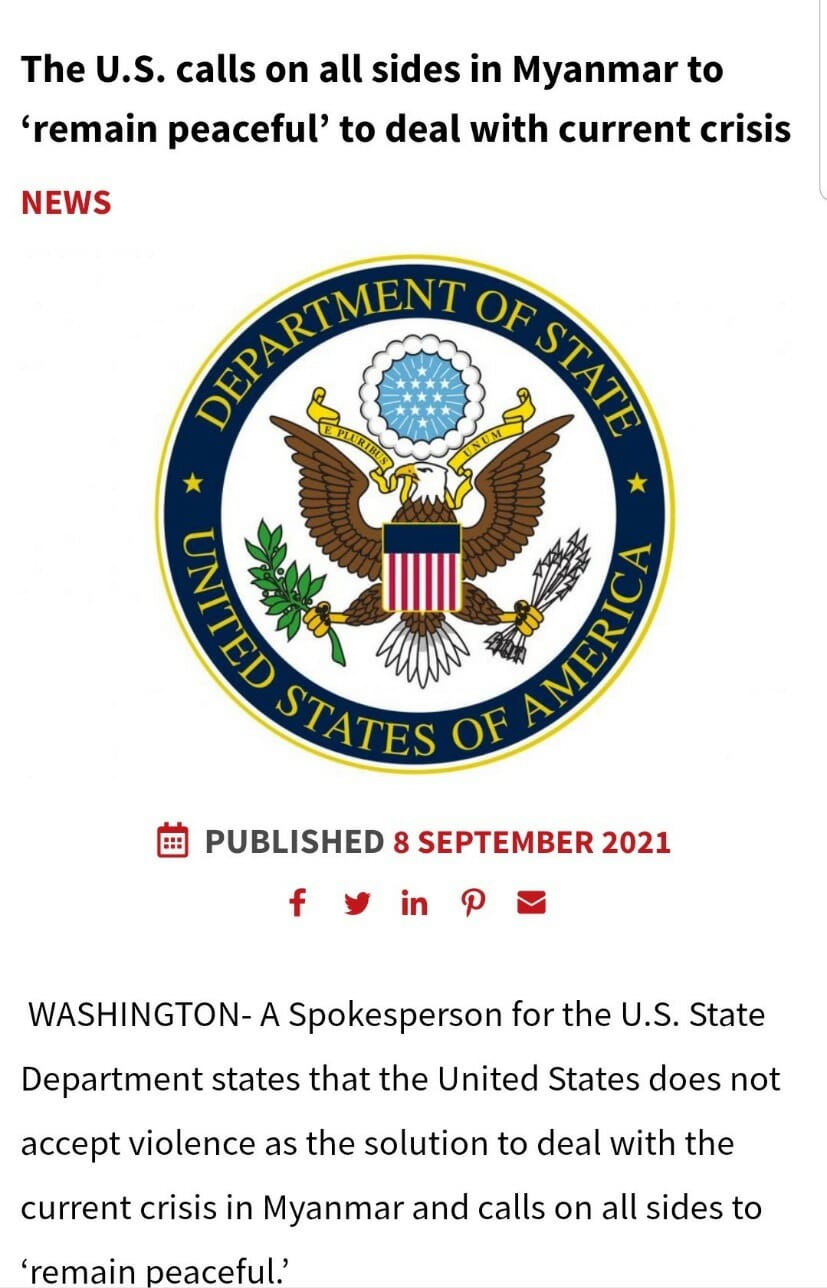
Nowhere is Washington’s lukewarm support for and political will for the Burmese democratic resistance more glaringly apparent than the two radically differing types of support and solidarity the United States Government offers to Ukrainian and Myanmar or Burmese resistance movements, irrespective of which party occupies the White House or which party controls the two houses of Congress.
Biden froze US$1 billion Burmese people’s sovereign fund in direct response to the coup in Naypyidaw a year ago. The American officials offered us the Burmese mindless tweets preaching “peaceful return to the democratic path” for months and President Biden himself has not done the right thing: release that $1 billion into the hands of the Burmese resistance under the political leadership of the exile National Unity Government.
The United States will provide Ukrainians with $13.6 billion in aid of which $6.5 billion is earmarked for the military assistance to Ukraine resistance via the Pentagon
This does not even include16,000 anti-tank weapons the US delivered to the Ukrainian resistance in the past 6 days alone, according to Amy Goodman of Democracy Now.
The inconvenient truth is this:
None of the leading liberal democracies of the West really honours the principles they loudly espouse such as non-violence, popular and state sovereignty, human rights, or democracy, nor do they support democratic resistance, armed or non-violent, unless such support serves their hidden interests, whether those interests are commercial or geostrategic.
Why I and Millions of Burmese Oppose Russia’s Invasion of Ukraine
Still, to me as a Burmese dissident, Putin’s invasion of Ukraine in the 21st century stands out as one of the most chilling cases, among other violations of inter-state-norms of sovereignty and international law by other global powers. If only because I do not want to live in the world order which is heavily influenced or controlled by blatantly and unapologetically autocratic mass-murderers.
The post-Cold War generation of Burmese activists have their own reasons to openly oppose Russian invasion of Ukraine. The Burmese within the country and in diaspora were outraged by the fact that Russia was the only global power that has shown absolutely no ambivalence in arming and backing Min Aung Hlaing regime. The public is aware of the fact that Russia has over the last 20 years been home to the largest number of Myanmar military officers overseas who receive advanced training in weapons engineering and other military sciences.
As part of my research into the inner workings of the Burmese armed forces, around 2008, I had debriefed several Burmese army-defectors who received advanced training in weapons engineering in St Peterburg and Moscow. I did not like what I found: the top military leaders of Myanmar – from the now retired duo of Senior Generals Than Shwe and Maung Aye in the early 2000’s to the present-day crop of Min Aung Hlaing and his deputies – have built very close military-to-military ties with Moscow. Like China next door, the Russian Federation has proven to be a 100% reliable protector and enabler of Myanmar regimes at the Security Council, guaranteeing not just one, but a double-veto, in any binding resolution against Myanmar.
As a politically conscious Burmese boy who grew up in Mandalay during the Cold War, my beef against Russia goes deeper – and is more psychological. Known for our literary imagination and wit, we Mandalayan nicknamed the military regime’s jails and torture chambers “Moscow” during General Ne Win’s murderous dictatorship. A few of my own relatives – cousins and uncles – had been sent to “Moscow”. Ohn Kyaw Myint, my late mother’s class-mate and a fellow poet at Mandalay University, was executed in “Moscow” – Insein Jail in 1976: as a personal staff officer to the Deputy-Commander-in-Chief, he plotted an abortive coup against a group of deeply unpopular dictators led by the Chairman & ex -General Ne Win.
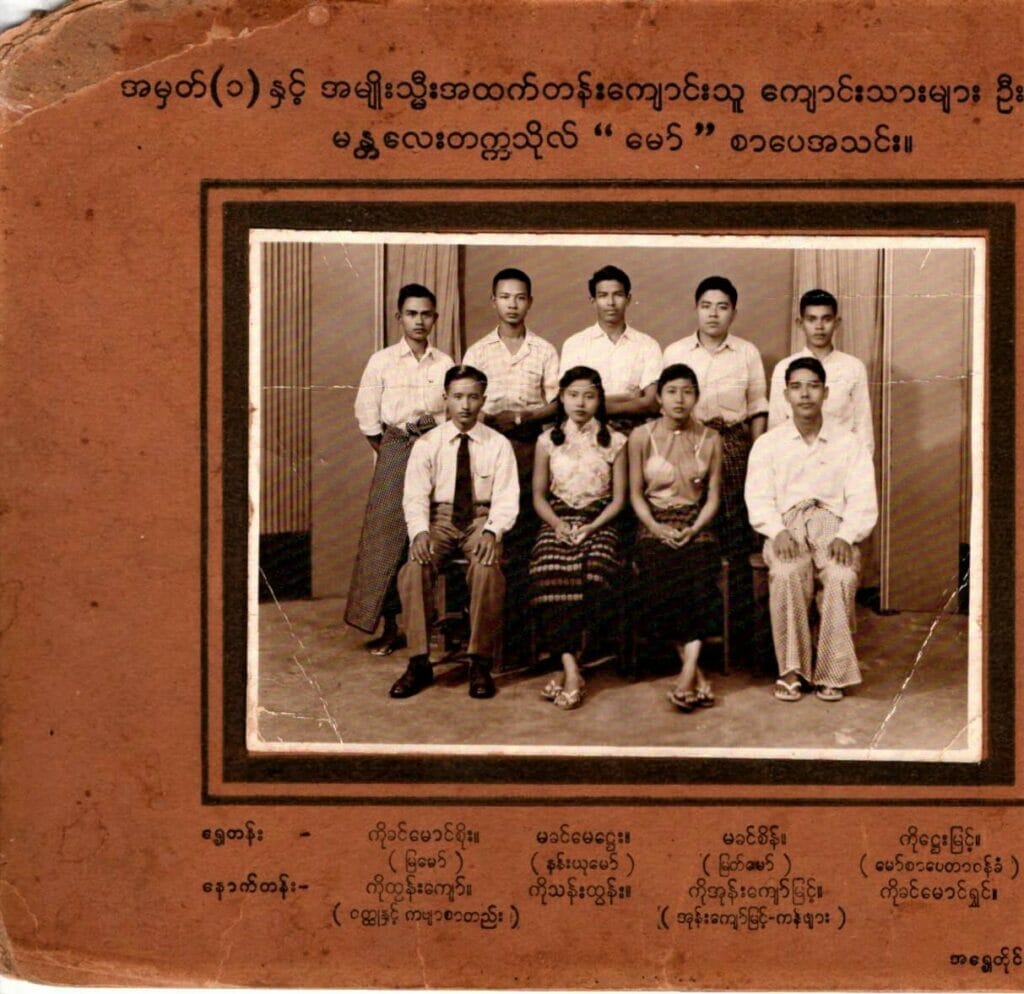
The late Captain Ohn Kyaw Myint, the executed ringleader of the 1976 assassination plot against the Burmese military dictators (the one in white shirt, with folded arms, standing in the back row), with my mother Daw Khin Sein (seated in the front row, in brown sleeveless blouse), Mandalay University, 1960.
I heard first-hand tales of torture and inhumane treatment of political prisoners including our equivalent of national poet laureate Saya Ba Gyan (pen name Tin Moe). According to the late Tin Moe, even after initial torture for forced and false confessions, dissidents behind bars are made to share a tiny cell where their dignity is stripped off by having to share a toilet bowl among a dozen prisoners.
Little did we know that our “Moscows” were staffed with and directed by Ne Win’s military intelligence executioners and torturers most of whom were trained inter alia by CIA and British security agencies. But that’s a story for another day.
One Russian colonel who was a military attaché stationed in Myanmar expressed his bewilderment at my well-known opposition against the military regime of dictator Than Shwe, and then proceeded to tell me face-to-face that “your country is freer than Singapore”: he could not access certain international networks such as Al Jazeera English while staying in Singapore while that was not the case in Yangon! We were chatting during a coffee break at the annual Shangri-La Dialogue in 2008 organized and hosted by the London-based, pro-American International Institute of Strategic Studies in the city-state.
Several years after my unpleasant encounter with the Russian colonel in Singapore, I found myself chairing a foreign policy lecture by Putin’s deputy Serge Lavrov at the University of Brunei in January 2012. In my introduction to the visiting Russian Foreign Minister, I simply could not bring myself to say anything warm or laudatory about Putin’s man from real Moscow who visited my university to talk about Russia’s regional architecture for security in Asia-Pacific. So, I ended up scrambling a succinct and heartfelt introduction about the civilization of Russia and its literary and intellectual gifts to the world– the likes of Tolstoy and Chekov.
My heart does not beat for Moscow.
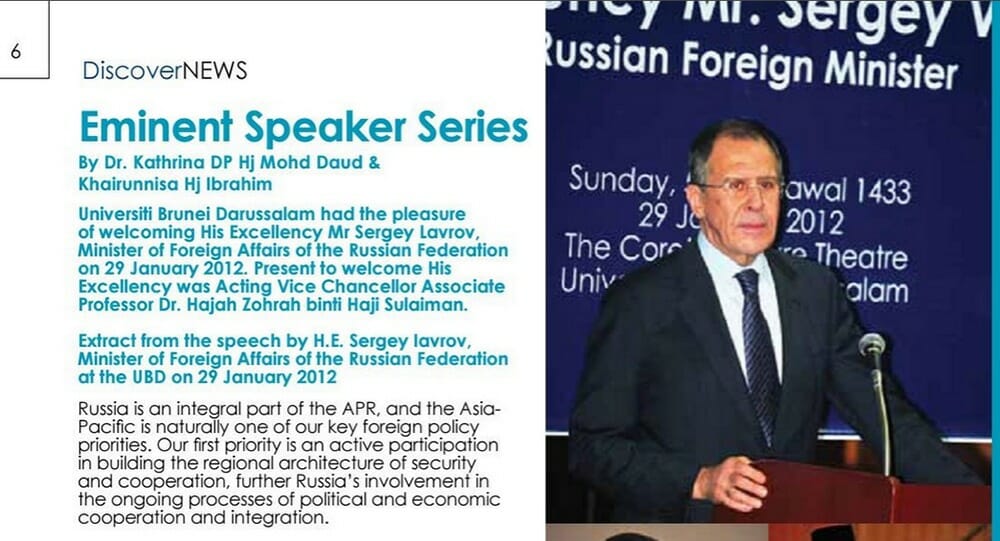
Russian Federation Minister of Foreign Affairs, Sergey Lavrov delivering a lecture on Russian foreign policy at Universiti Brunei Darussalam (UBD), 29 January 2012.
Russian Federation Minister of Foreign Affairs, Sergey Lavrov delivering a lecture on Russian foreign policy at Universiti Brunei Darussalam (UBD), 29 January 2012.
Like many millions of people worldwide I cannot but feel the psychological impact of the Russian invasion of an independent country and repulsed by Moscow’s rather twisted Casus belli, which included the need to “liberate Ukraine” from the Western puppet regime of Zalensky, “de-nazify” the country, pre-empt the national security threat rising from pro-NATO Kyiv, and prevent “genocide” against Russian minorities in Donetsk and Luhansk, whose separatist movement Kremlin reportedly financed.
I saw a short videoclip of the rather witty Ukrainian Permanent Representative at the United Nations, mocking Lavrov’s jaw-droppingly Orwellian justification for Russia’s crime against peace.
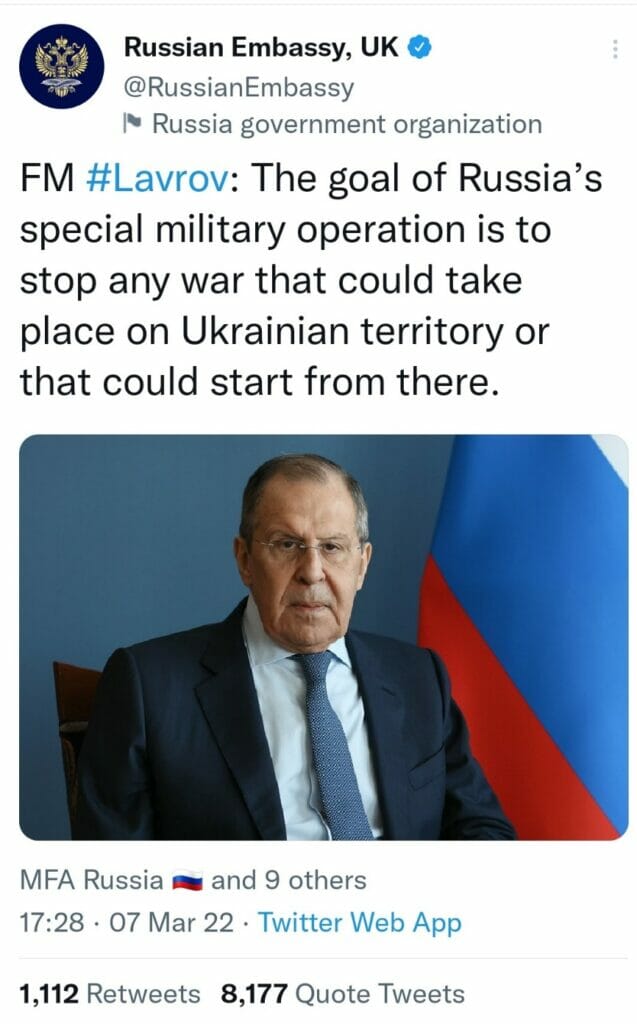
The Russian apparently said, “the goal of Russia’s special military operation in Ukraine is to stop any war that could take place on Ukrainian territory or that could start from there.”
Whatever Putin’s justifications – historical, geo-strategic, security-related or nationalistic – Moscow is committing the crime of aggression against a sovereign and independent country, with no provocation. The crime of aggression or crime against peace was one of the charges for which the Nazi leaders were tried and convicted at the Nuremberg Trials.
Nuremberg Trials for Putin and his Accomplices?
In UK’s “paper of the masses,” the Daily Mail, Philippe Sands, Gambia’s legal counsel in the case against Myanmar at the International Court of Justice and the renowned legal scholar of crime against humanity and genocide, invoked Nuremberg for Putin (and his deputy accomplices) for Russia’s unprovoked war against a small neighbour.
Sands writes, “(Putin’s) invasion of Ukraine is a crime of aggression, a term also first used at Nuremberg, although then it was called a ‘crime against peace’.
At the Nuremberg judgment, where more than half the Nazi defendants were found guilty of it, aggressive war was branded the ‘supreme international crime’.
In Ukraine, it is being repeated. Which is why, yesterday, I joined Gordon Brown and others in supporting the call by Ukrainian Foreign Minister Dmytro Kuleba to set up an international tribunal — a new Nuremberg — to investigate Putin and his acolytes for the crime of aggression.”
Sands’ call for bringing Putin to justice is echoed by the last living prosecutor of Nuremberg Trials, Benjamin Ferencz of Florida, who turned 102 this week. He told another British tabloid The Mirror.
“The crimes now being committed against Ukraine by Russia are a disgrace to human society, those responsible should be held accountable for aggression, crimes against humanity and plain murder. As sooner they start dragging the criminals before a court the happier we will be.”
The evocative Nuremberg Trials which the two renowned Jewish lawyers recently invoked has failed to serve as a deterrent against any future crimes against humanity and genocides, having rendered “Never again!” a cruel joke for all post-Holocaust victims, numbering millions around the world.
Meanwhile, the other Nuremberg of the Nazis – where the Nazi leaders decreed their infamous Race Laws – has continued to hold sway with unsavoury regimes – from Myanmar and India in Asia, and most ironically, the officially Jewish state of Israel in the Middle East. The common thread across these vastly different contexts – Nazi Germany, Myanmar, India and Israel – is a blatant and official act and policy of racial and religious profiling of national minorities as a threat to a nation and national security
It is worth a glance at the United States Holocaust Memorial Museum’s succinct elaboration on Nuremberg Race Laws and hear the chilling echoes of Nuremberg of the 1930’s in today’s Myanmar, India and Israel.
“Did you know? In Nazi Germany the state determined who you were and how you were treated. …
In Nazi Germany, the government initiated and enforced policies and legislation that sanctioned racial discrimination. The Nazis sought to unite all Germans, as defined by law, in the so-called “National Community.” The state would then provide Germans with the best education, health care, social programs, and recreational opportunities available. The state served no other purpose than the preservation and expansion of the National Community (bold lettering original).” Read more: Nuremberg Race Laws: Defining the Nation.
Just this week Israel’s parliament – called the Knesset – voted for the apartheid state’s exclusionary and racist legislation, democratically, before the lawmakers break for holidays.
Israel continues to enjoy unconditional support from the United States, although apartheid is a crime against humanity in international law, and colonial occupation is no longer an acceptable conduct of states.
No head of state nor senior officials from amongst the five Permanent Member states (or Perm Five) and their “bastards”, that is, dodgy leaders worldwide, who enjoyed protection by the veto-wielders at the Security Council has ever been brought to justice for any breach of inter-state treaties or international law, including the Geneva Conventions, or genocides, war crimes and crimes against humanity.

The emotions have evidently got the better of these world-renowned lawyers.
Al Jazeera English columnist Andrew Mitrovica, writes in his column on 8 March 2022, “It is … astonishing to see Western media and foreign ministers catch the same express bus to the International Criminal Court at The Hague to demand that the bad guys be charged with war crimes while the good guys in Tel Aviv and beyond will always escape a similar fate and judgement.”
Only South African Foreign Minister Naledi Pandor appears to have taken note of Israel’s crimes against humanity and officially told the parliament of her country that her government will oppose Israel’s African Union observer status, based on AU Charter rejecting “colonialism, racism, and illegal occupation.”
No doubt the kaleidoscopic views of the 24 February Russian invasion of Ukraine will shed light on many layers of facts, contexts and complexities, amidst the competing media/popular and policy narratives, that have been generated and circulated as a natural part of the war of information (and misinformation).
See the two opposing analyses of the Russian invasion of Ukraine:
- John Mearsheimer on why the West is principally responsible for the Ukrainian crisis
- Putin is trying to take down the entire world order, the veteran Russia watcher said in an interview
The War and the West’s Skin-Based Civilization
Beyond the good and evil of this unfolding Russian-Ukrainian war in its early days, one thing has become abundantly clear to those of us from the so-called Global South: the 21st century too is defined by “the colour line” of the centuries past.
In 1903, the pioneering scholar, Du Bois, the first American of African descent who earned a PhD from Harvard and a founder of the National Association for the Advancement of Colored People (NAACP), the oldest civil rights organization in the United States, wrote, “the problem of the twentieth century is the problem of the color line – the relation of the darker to the lighter races of men in Asia and Africa, in America and the islands of the sea.” The world today continues to be haunted by his prescient words.
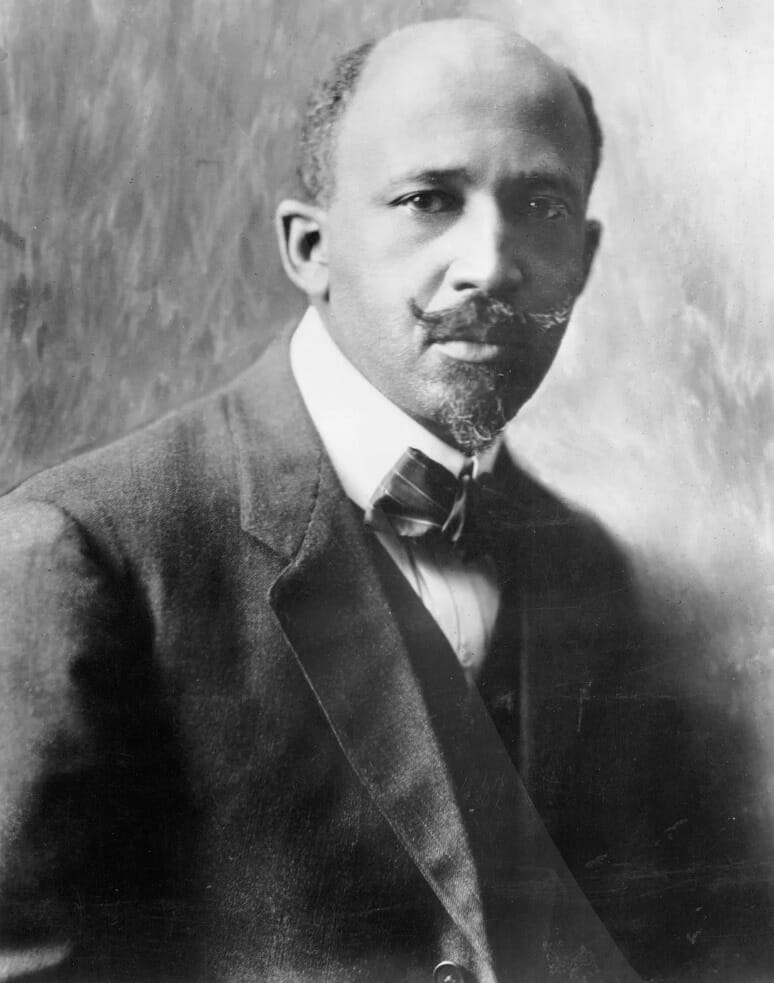
W. E. B. Du Bois
Post-Holocaust and post-World War II world has continued to witness waves of the gravest crimes in international law including multiple crimes against peace (or aggression), mass deportation, land grabs, apartheid, genocides, and war crimes – not to mention regime changes through covert operations. Enter Israel, Cambodia, Indonesia, West Pakistan, China, Afghanistan, Iraq, Sri Lanka, Syria, Lebanon, Libya, Saudi Arabia and so on.
None has psychologically and emotionally jolted the Western World of White Christian societies in the same way Russian invasion of Ukraine over the last 3 weeks has.
Communities, and citizens, “remorseful” corporations and universities, not to mention sporting organizations, music and concert associations, and humanitarian INGOs – from fast-food chains McDonald and Starbucks and High Street stores Zaya, H & M, from central banks and resource-extractive industries to the Ivy League and Oxbridge, from the “Gold Standard” media outlets such a BBC and CNN – have re-discovered the ideals and principles on which post-Holocaust world is supposedly anchored in, namely, sovereignty, international law, humanitarianism, human rights, rule-based peaceful world order.
Throw in some spiritual elements of compassion, kindness, #RefugeeWelcome, and fellowship of humans. Even corporations – legal fictions – are assigned human-like conscience, if we are to go by Reuters’ coverage.

- Cardiff Philharmonic removes Tchaikovsky from programme in light of Russian invasion of Ukraine
- Montreal Symphony Orchestra drops Russian piano prodigy from concerts amid backlash
- Nestle, tobacco groups, gamemaker Sony join move away from Russia
Al Jazeera English journalist, Andrew Mitrovica, was one of the journalists who have apparently been outraged by the blatant and widespread racism in the western mass media. In his column entitled “Some lives are more valuable than others” (8 March 2022), he writes, “there can no longer be any doubt about this egregious fact: too many Western journalists sent to Ukraine to report on another disfiguring war believe that some lives are more valuable than others.
Their transparently racist coverage of Vladimir Putin’s ruthless invasion confirms that they deem the suffering and deaths of white Christians more distressing and worthier of the world’s focus and empathy than the suffering and deaths of war-ravaged Ethiopians, Somalis, Sudanese, Yemenis, Syrians, Afghans, Libyans, Iraqis, and, of course, Palestinians.”
The feeling of solidarity felt is so strong that the British Foreign Secretary Lizz Truss had openly endorsed the idea of British veterans and citizens (with weapons’ training?) to go and fight Putin’s troops in Ukraine while BBC journalists evidently feel it within their journalistic remit to share tips on Twitter on how to throw Molotov cocktails at Russian armoured vehicles and tanks.
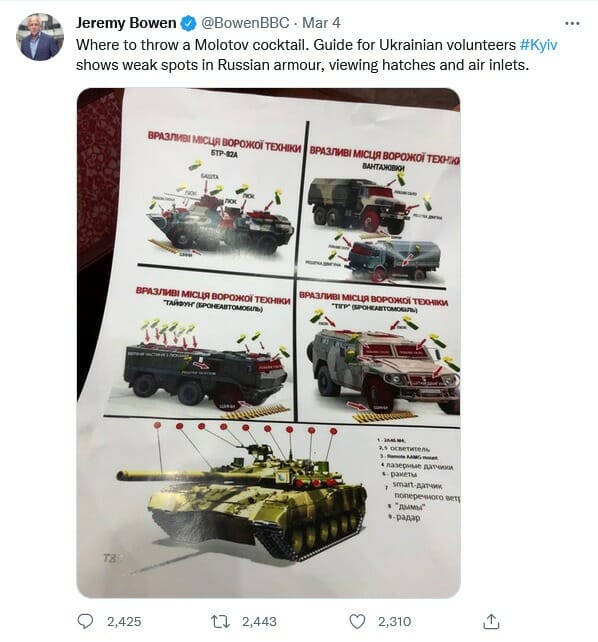
It is indeed heart-warming to read the news of Britons answering the call of human solidarity by the British Foreign Secretary.

Whatever the “expert” explanations, this sudden revival of the collective humanity and the spirit of solidarity in the West may be viewed as a silver-lining in the dark clouds precipitated by Putin’s crime against peace.
Populist governments and parties in Eastern Europe, as well as in the richer Western European nations such as Britain, that rode to power on anti-refugee and anti-immigration planks are now screaming at their executive branches for being slow in letting the 2-million Ukrainian refugees in.
The 27-member European Union that had infamously financed the ex-genocidal militia in Sudan – known as Janjawee – to act as off-shore border-guard force in Africa in order to keep war-fleeing brown and black refugees away from the shores of Europe unanimously voted to open Fortress Europe’s doors to Ukrainians.
As a brown-man from the strife-torn genocidal Myanmar, a formerly Burma under the British rule from 1825 –1948, I have been crying out loud for an ounce of human solidarity and compassion – for the oppressed “at home” – from this rich, technologically advanced liberal Trans-Atlantic civilization for the last 30-plus years, without much success.
The New York Times. March 9, 2022
I naturally welcome the expressions and acts of solidarity, pervasive compassion and moral outrage of the West over Russian invasion of Ukraine, however jarring and nauseating they may feel.
My Ukrainian brother Petro may be obligated to stay in his country under Putin’s siege, but his family – wife and children – will be among the millions who will be the immediate beneficiaries of Europe’s revival of civilization.
It is indeed welcome news that the Western World, white and Christian – built on Trans-Atlantic slave trade, slavery, colonial conquests of loot and landgrab worldwide, the carbon-based industrialization, money-laundering and genetic and social engineering over the last 500 years – is rediscovering the universal values of compassion and kindness. Or has it?
My only hope, however feeble and improbable it may be, is this:
This White Christian Western world will be gracious enough to extend its new-found compassion, humanist ideals and worthy principles of cooperation and solidarity to Fanon’s Wretched of the Earth, that is, the likes of Afghanis, Myanmarese, Palestinians, Uyghurs, Syrians, Ethiopians, Yemenese and so on.
That, my friends, would make the Western discovery of universal fellowship of humans well worth its long wait of 500 years since Columbus’s “discovery” of the New World!
___________________________________________
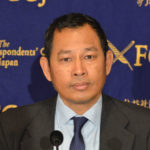 A Buddhist humanist from Burma (Myanmar), Maung Zarni is a member of the TRANSCEND Network for Peace Development Environment, former Visiting Lecturer with Harvard Medical School, specializing in racism and violence in Burma and Sri Lanka, and Non-resident Scholar in Genocide Studies with Documentation Center – Cambodia. Zarni s the co-founder of FORSEA, a grass-roots organization of Southeast Asian human rights defenders, coordinator for Strategic Affairs for Free Rohingya Coalition, and an adviser to the European Centre for the Study of Extremism, Cambridge. Zarni holds a PhD (U Wisconsin at Madison) and a MA (U California), and has held various teaching, research and visiting fellowships at the universities in Asia, Europe and USA including Oxford, LSE, UCL Institute of Education, National-Louis, Malaya, and Brunei. He is the recipient of the “Cultivation of Harmony” award from the Parliament of the World’s Religions (2015). His analyses have appeared in leading newspapers including the New York Times, The Guardian and the Times. Among his academic publications on Rohingya genocide are The Slow-Burning Genocide of Myanmar’s Rohingyas (Pacific Rim Law and Policy Journal), An Evolution of Rohingya Persecution in Myanmar: From Strategic Embrace to Genocide, (Middle East Institute, American University), and Myanmar’s State-directed Persecution of Rohingyas and Other Muslims (Brown World Affairs Journal). He co-authored, with Natalie Brinham, Essays on Myanmar Genocide.
A Buddhist humanist from Burma (Myanmar), Maung Zarni is a member of the TRANSCEND Network for Peace Development Environment, former Visiting Lecturer with Harvard Medical School, specializing in racism and violence in Burma and Sri Lanka, and Non-resident Scholar in Genocide Studies with Documentation Center – Cambodia. Zarni s the co-founder of FORSEA, a grass-roots organization of Southeast Asian human rights defenders, coordinator for Strategic Affairs for Free Rohingya Coalition, and an adviser to the European Centre for the Study of Extremism, Cambridge. Zarni holds a PhD (U Wisconsin at Madison) and a MA (U California), and has held various teaching, research and visiting fellowships at the universities in Asia, Europe and USA including Oxford, LSE, UCL Institute of Education, National-Louis, Malaya, and Brunei. He is the recipient of the “Cultivation of Harmony” award from the Parliament of the World’s Religions (2015). His analyses have appeared in leading newspapers including the New York Times, The Guardian and the Times. Among his academic publications on Rohingya genocide are The Slow-Burning Genocide of Myanmar’s Rohingyas (Pacific Rim Law and Policy Journal), An Evolution of Rohingya Persecution in Myanmar: From Strategic Embrace to Genocide, (Middle East Institute, American University), and Myanmar’s State-directed Persecution of Rohingyas and Other Muslims (Brown World Affairs Journal). He co-authored, with Natalie Brinham, Essays on Myanmar Genocide.
Tags: Burma/Myanmar, Putin, Russia, Ukraine
DISCLAIMER: The statements, views and opinions expressed in pieces republished here are solely those of the authors and do not necessarily represent those of TMS. In accordance with title 17 U.S.C. section 107, this material is distributed without profit to those who have expressed a prior interest in receiving the included information for research and educational purposes. TMS has no affiliation whatsoever with the originator of this article nor is TMS endorsed or sponsored by the originator. “GO TO ORIGINAL” links are provided as a convenience to our readers and allow for verification of authenticity. However, as originating pages are often updated by their originating host sites, the versions posted may not match the versions our readers view when clicking the “GO TO ORIGINAL” links. This site contains copyrighted material the use of which has not always been specifically authorized by the copyright owner. We are making such material available in our efforts to advance understanding of environmental, political, human rights, economic, democracy, scientific, and social justice issues, etc. We believe this constitutes a ‘fair use’ of any such copyrighted material as provided for in section 107 of the US Copyright Law. In accordance with Title 17 U.S.C. Section 107, the material on this site is distributed without profit to those who have expressed a prior interest in receiving the included information for research and educational purposes. For more information go to: http://www.law.cornell.edu/uscode/17/107.shtml. If you wish to use copyrighted material from this site for purposes of your own that go beyond ‘fair use’, you must obtain permission from the copyright owner.
